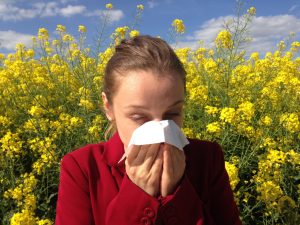
The International Student’s Guide to Beating Hay Fever
 Hay fever, also known as allergic rhinitis, is a common condition that affects many people, including international students studying in the UK. With its picturesque landscapes and abundance of greenery, the UK can be a haven for allergens such as pollen, triggering hay fever symptoms. In this article, we will provide you with essential tips to help protect yourself from hay fever and enjoy your time in the UK during the allergy season.
Hay fever, also known as allergic rhinitis, is a common condition that affects many people, including international students studying in the UK. With its picturesque landscapes and abundance of greenery, the UK can be a haven for allergens such as pollen, triggering hay fever symptoms. In this article, we will provide you with essential tips to help protect yourself from hay fever and enjoy your time in the UK during the allergy season.
Understand the Triggers
It’s important to understand the triggers that cause hay fever symptoms. In the UK, the main culprit is pollen, which is released by grass, trees, and flowers during the spring and summer months. Stay updated on pollen forecasts, as they can help you anticipate high pollen levels and plan your activities accordingly.
Minimize Exposure
Minimizing your exposure to pollen is crucial in managing hay fever symptoms. Consider the following tips:
- Keep windows closed: When pollen counts are high, keep your windows closed, especially in the early morning and evening when pollen levels tend to peak.
- Avoid outdoor activities during high pollen times: Try to limit your time outdoors when pollen counts are at their highest. Check local pollen forecasts to determine the optimal times for outdoor activities.
- Wear sunglasses: Wearing sunglasses can help protect your eyes from pollen particles when you do go outside.
- Dry clothes indoors: Avoid drying your clothes outside, as they can collect pollen particles, which may trigger symptoms when worn.
Create a Pollen-Free Zone
Designating a pollen-free zone in your accommodation can provide relief from hay fever symptoms. Consider implementing the following measures:
- Keep windows and doors closed: Ensure that your living space remains free from pollen by keeping windows and doors closed, especially in your bedroom.
- Use air purifiers: Investing in an air purifier with a HEPA (high-efficiency particulate air) filter can help remove pollen and other allergens from the air, creating a cleaner and pollen-free environment.
- Regularly clean your living space: Dust and vacuum your living area regularly to minimize pollen buildup. Use a damp cloth to wipe surfaces and avoid spreading pollen particles into the air.
Manage Symptoms
If you do experience hay fever symptoms, there are several measures you can take to manage them effectively:
- Over-the-counter medications: Antihistamines, nasal sprays, and eye drops available at pharmacies can help alleviate symptoms such as sneezing, itching, and runny nose. Consult a pharmacist for guidance on suitable options.
- Allergy-proof bedding: Consider investing in allergy-proof bedding covers to create a barrier against pollen and dust mites, which can exacerbate hay fever symptoms.
- Rinse your nasal passages: Using a saline nasal rinse or spray can help flush out allergens from your nasal passages and provide relief from congestion and irritation.
- Seek medical advice: If your hay fever symptoms are severe or persistent, it’s advisable to consult a healthcare professional who can recommend appropriate treatments and provide personalized advice.
Stay Informed and Prepared
Stay informed about pollen forecasts and local pollen counts. You can access this information through weather apps, websites, or by subscribing to pollen alert services. Being aware of high pollen days allows you to plan your activities and take necessary precautions to minimize exposure.
Living with hay fever as an international student in the UK doesn’t have to be a hindrance to your enjoyment of the beautiful surroundings. By understanding the triggers, minimizing exposure, creating a pollen-free zone, managing symptoms, and staying informed, you can effectively protect yourself from hay fever and make the most of your time in the UK. Remember to consult healthcare professionals for personalized advice, and don’t let hay fever dampen your experience of this vibrant country.





